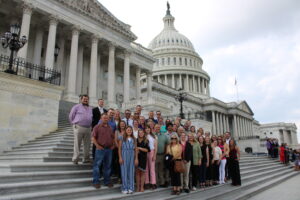As the initial flurry of activity in the new administration and Congress moves into the heat of summer in Washington, the challenges and fault lines that come with addressing major issues including labor, trade and taxes are becoming increasingly clear.
This should come as a surprise to no one.
To put it plainly, change is difficult. Movement on issues that have seen decades of gridlock and tinkering along the edges because of a lack of political will are especially hard. This isn’t a secret, and the turbulence agriculture policy is seeing is likely to continue for some time. While that’s occurring, it will be important for everyone in dairy and agriculture to remain focused on advancing our industry and ensuring that we embrace the current environment for its opportunities while remaining vigilant among its threats.
Take labor, for example. The balance between the administration’s goals of ensuring border security and deporting people who are not legally residing in the United States with ensuring the economic health of rural communities by maintaining an adequate workforce for farms is clearly recognized by the president and by USDA Secretary Brooke Rollins. We are grateful for the president’s sympathy for farmers and the secretary’s work on their behalf — still, but more importantly, his continued willingness to tackle complex policy topics that have languished for decades.
That’s why we agree with Jim Boyle, the vice-chairman of NMPF member co-op the United Dairymen of Arizona who we recently profiled in our Farmer Focus feature series. “The president is right about securing the border, but any enforcement action needs to go hand-in-hand with a labor reform package,” he said.
We continue to work for either a change to the current H2-A farmworker visa that will accommodate dairy’s year-round nature or, in the absence of that, a new guestworker program that meets dairy’s needs. In the meantime, dairy farmers who are meeting requirements for worker documentation shouldn’t be living with worries about immigration raids on their farms. It isn’t good to have open borders and criminals crossing over it. But it’s also not good for dairy farmers, or rural communities, to be deprived of hard-working, law-abiding labor that’s paid well and willing to do work native-born Americans have always been less willing to do, caring for animals around the clock and ensuring a steady supply of nutritious dairy products for Americans and the world.
Similarly, efforts to dramatically reset trade relationships worldwide are inevitably meeting challenges. But for all the concern over tariffs, it’s also important to remember that, through April, the value of U.S. dairy exports in 2025 is actually higher than it was the previous year. While no one is claiming that everything is roses on the trade front, it’s critical to remember that U.S. dairy continues to compete successfully and build relationships with global partners amid the day-to-day noise of headlines.
And finally, policy advancements are happening domestically. The Senate is poised to pass its own version of The Big, Beautiful Bill that the House approved in May. The differences between the two chambers are significant, and negotiations over details may take maddeningly long. But with major tax increases looming in 2026 if Congress doesn’t get its work done in time, the incentives to complete a package are overwhelming. And both versions contain significant wins for dairy farmers, from the extension of the Dairy Margin Coverage Program through 2031 to making permanent the Section 199(A) tax deduction that helps cooperatives stay competitive.
Rome wasn’t built in a day, decades of unfair trade policies won’t evaporate overnight, and farm-labor issues that haven’t been taken seriously since the last major legislation in 1986 won’t be solved in one growing season. But dairy will survive, and can thrive, as these critical questions gain serious attention and a genuine desire for answers. We are in for a hot summer and a challenging fall. But we can, and will, come out ahead.
Gregg Doud
President & CEO, NMPF



 By Theresa Sweeney-Murphy, Senior Director, Communications & Outreach
By Theresa Sweeney-Murphy, Senior Director, Communications & Outreach





